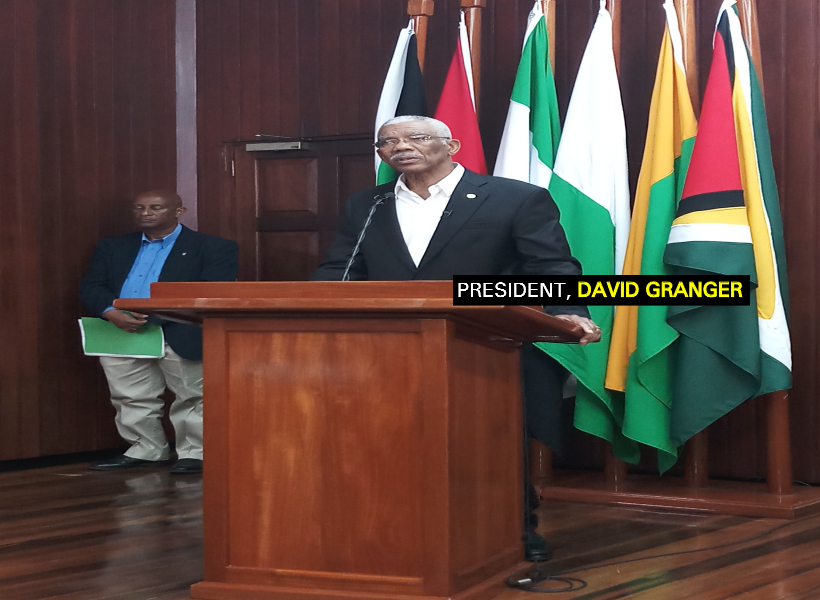President David Granger yesterday briefed private sector and civil society stakeholders on recent political developments.
The meeting was preceded by a similar engagement with members of the diplomatic corps earlier in the day at the Baridi Benab, State House.
The Head of State explained that the purpose of the engagement was to clarify recent political developments which have been subject to some misinterpretation and misrepresentation of the government’s intentions.
“I have asked you to come, to emphasise Government’s commitment to upholding the Constitution; respecting the institutions of the State – including the National Assembly and the Courts; to ensuring the rule of law; to safeguarding human and civil rights; and to preserving our democracy especially through the conduct of free, fair and credible Local and General and Regional Elections,” he said.
President Granger recapped the events following the December 21, 2018 vote and the Caribbean Court of Justice’s (CCJ) ruling regarding the Coalition Government’s status. He reiterated that no dates or timelines were issued by the CCJ and stated that while the December 21, 2018 vote was declared valid, “the Caribbean Court of Justice has made no coercive orders.”
“The government is, therefore, not in contravention of the Orders of the Court or the Constitution,” the President further expressed.
In driving home his point, President Ganger quoted the CCJ’s ruling.
“It would not, therefore, be right for the Court by the issuance of coercive orders or detailed directives to presume to instruct these bodies on how they must act and therefore pre-empt the performance by them of their constitutional responsibilities. It is therefore not, for example, the role of the Court to establish a date on or by which the elections must be held or to lay down timelines and deadlines which in principle are the preserve of political actors guided by constitutional imperatives.”
He also took the opportunity to address the appointment of a chairman for the Guyana Elections Commission (GECOM). The Head of State told the private sector and civil society stakeholders that the appointment of Justice (Retired) James Patterson as GECOM’s chairman was flawed and, as such, accepted his resignation.
Since then, the president has been actively engaged in the process of appointing a new one.
“I have acted in good faith. I met the Leader of the Opposition twice since the CCJ issued its rulings, first on [July 4, 2019] and, again, on [July 16, 2019] and I will meet him again and again until a Chairman is appointed.”
It was highlighted that the government and opposition appointed two teams to continue the process of identifying nominees for the position of Chairman of the Elections Commission. These teams met four times between July 8, 2019, and July 17, 2019.
The Head of State also noted the CCJ’s interpretation of his role in the GECOM Chairman’s selection process. Quoting the CCJ’s ruling, President Granger highlighted this.
“Once the President and the Leader of the Opposition have hammered out a list of names not unacceptable to the President, the list, comprising the six persons, must then formally be submitted to the President by the Leader of the Opposition and the President must then select the Chairman from among those names.”
“In other words, the president is not a passive bystander to the process. He is an active participant in ‘hammering out’ the list of persons ‘not unacceptable’ to him,” he expressed.
In closing, the Head of State reiterated the government’s commitment to comply with the CCJ’s orders, the expeditious appointment of the GECOM Chairman and free and credible elections as soon as possible. (Department of Public Information)













